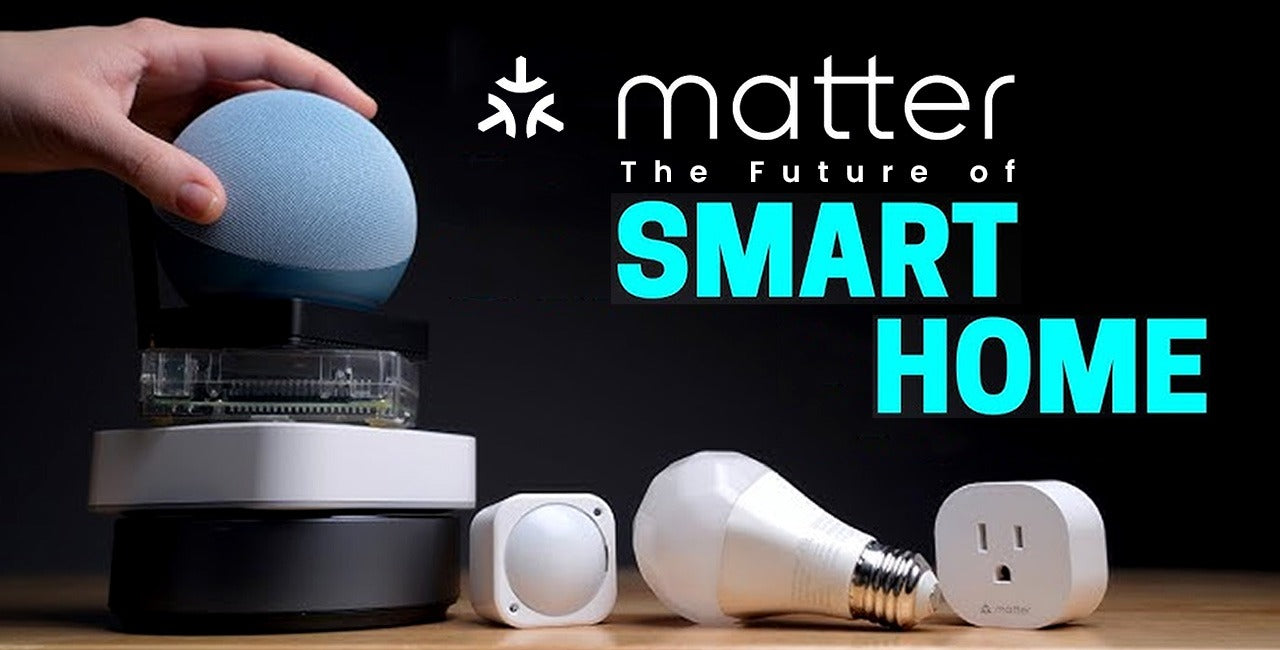MATTER - The Future of Smart Homes

Our homes are getting smarter every day, with new devices appearing on the market all the time. But one of the biggest challenges for smart home enthusiasts has been compatibility. Devices from different manufacturers often don't work together, which can make it frustrating to create a truly integrated smart home system.
A new standard called “Matter” is designed to change that. Matter is a seal of approval that guarantees smart devices will work together seamlessly, regardless of the manufacturer. This means that you'll be able to mix and match devices from different brands without having to worry about compatibility issues.
Matter is already being rolled out to millions of devices through software updates. So, if you have a smart home device that's compatible with Matter, you'll soon be able to connect it to other Matter-enabled devices in your home. This means you can use your favorite voice assistant (like Amazon Alexa, Apple Siri, or Google Assistant) to control any Matter-compatible device in your home.
KEY FEATURES OF MATTER:
- Seamless Compatibility: Devices from various manufacturers can work together seamlessly.
- Platform Agnostic: You can choose the voice assistant or smart home platform you prefer.
- Enhanced Security: Matter prioritizes security to protect your data and privacy.
- Easy Setup: Setting up Matter-compatible devices is generally straightforward.
- Local Network Operation: Devices can function even when your internet connection is down.
HOW DOES MATTER WORK?
Matter uses a combination of Wi-Fi, Thread, and Bluetooth Low-Energy (BLE) technologies for communication and device setup. It operates on your local network, ensuring faster and more responsive control of your smart home devices.

PROS OF MATTER:
- Simplified Smart Home Experience: Eliminates compatibility headaches and allows for a more integrated system.
- Increased Device Choice: You can select devices based on your preferences without worrying about compatibility.
- Enhanced Security: Protects your personal information and ensures secure communication.
- More Options for Smart Home Hubs: Matter provides greater flexibility in choosing smart home hubs, allowing users to control devices with any compatible hub rather than being tied to a specific brand or platform.
- Future-Proofing: Matter is designed to evolve and support new technologies and devices.
CONS OF MATTER
- Limited Availability: As a new standard, Matter has few compatible devices, but this is expected to improve with broader manufacturer adoption.
- Need for New Hardware: Users may need to invest in new hubs or devices, which can be costly, especially for existing smart home setups.
- Competition: Matter faces competition from established standards like Z-Wave and Zigbee, making its long-term dominance uncertain.
- Limited Functionality: Manufacturers can retain proprietary features, meaning some advanced functionalities may require specific apps or assistants.
- Restricted Data and Features: Access to certain features may be limited when using a Matter controller, affecting device performance.
- Limited Compatibility: Major platforms may only support specific Matter device types, resulting in compatibility issues within the ecosystem.
THE FUTURE OF MATTER
With significant backing from major tech companies, Matter's ecosystem is expanding rapidly. Over 400 companies are now members of the Connectivity Standards Alliance (CSA), with 280 actively developing Matter-compatible products. Notable players include:
- Major-Tech Giants: Amazon, Apple, Google, Samsung SmartThings
- Smart Home Leaders: Signify (Philips Hue), Assa Abloy (Yale/August), Ikea
- Device Manufacturers: Arlo, Belkin, Cync, GE Lighting, Nanoleaf, Sengled
Neo and Moes, Chinese smart home brands, are planning to adopt Matter technology. This will allow their future products to connect and interact seamlessly with other Matter-compatible devices, creating a more unified and user-friendly smart home experience.
Matter technology is designed for a wide range of smart home products, including:

- Smart Lights: Bulbs and lighting systems that can be easily controlled and integrated.
- Smart Thermostats: Devices that allow for temperature regulation and energy savings.
- Smart Security Systems: Cameras, alarms, and sensors for enhanced home security.
- Smart Locks: Keyless entry systems that can be controlled remotely.
- Smart Speakers and Displays: Devices that facilitate voice commands and multimedia control.
- Smart Appliances: Refrigerators, ovens, and washing machines that offer connectivity features.
- Smart Sensors: Motion, temperature, and humidity sensors for home automation.
- Smart Plugs and Switches: Accessories that make existing devices smart.
By utilizing Matter technology, these products ensure seamless integration and interoperability across different brands and ecosystems.
Are you ready to experience the future of smart home technology?
Matter is paving the way for a more connected, convenient, and secure home environment. As more devices become Matter-compatible, we can expect a seamless and intuitive experience that enhances our daily lives.
KEY CONSIDERATIONS:
- Device Compatibility: Not all devices will be Matter-compatible. Check with manufacturers to determine if their products support the standard.
- Platform Support: Ensure that your preferred voice assistant or smart home platform supports Matter.
- Firmware Updates: Some devices may require firmware updates to become Matter-compatible.
- Ongoing Development: Matter is an evolving standard, and new features and capabilities may be added in the future.










